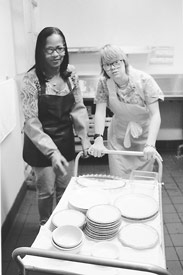|

A DAY IN THE WORKING LIFEScherry St. Julien: Alameda County ARC Job Coordinator Related Story: "We Need a Raise ARC Workers Tell Lawmakers
"At first we are with them their whole shift. If they work eight hours, we work eight hours. We even alter our days off to their days off," explains St. Julien. "Most employers don't have the time, patience, or consistency to train our clients, so we do it all. Initially an employer is actually getting two workers for the price of one. "We both learn together on the job. I make sure there are no problems,
interact with their supervisors, make sure they get their job evaluations,
and try to deal with any issues before they get to be a problem. "We do a lot of mediating because sometimes our clients don't understand the system. You have to use your own judgment to know when to back off. Maybe you will let them start their days without you, and then let them end their day without you. You determine when they are comfortable enough to accept more responsibility." Once her clients have completed this intense phase, St. Julien checks up on them once a week as part of her route, which takes her over most of southern Alameda County. As part of her follow along, St. Julien and other job coordinators have begun assuming the social worker functions of the job, such as setting achievable goals to give clients a measure of success, as well as taking care of any off-the-job needs her clients might have that pertain to continuing employment. Job coordinators develop close, protective relationships with their clients. "I enjoy working with them more than with the so-called normal population," says St. Julien. "They are open to their feelings, are very humble, and are some of the best employees. They get to their jobs early, are dependable, don't lie, and are very honest. It's hard for me to think of them as disabled. When you think about it, we are all disabled in some way. My disability shows up when I have to use a computer. "I love my job and the feeling of being needed. Not everyone is able to work with the disabled. It takes a special person and can be very stressful. But the hardest part is the pay. It's not great, to put it mildly. We have staff who have been here since 1973 and don't make over $12.00 an hour. It's difficult to keep good people. We love the job, but when it comes time to pay the bills, what does love have to do with it? "Many people leave because they can make more money other places with less responsibility. I have clients who make more than me. When I started here I made $9.22 an hour and I had a client who was making $10.00 an hour. The next month he got a raise and was making $10.49. "If we were not here our clients couldn't work, ARC would have to start turning away people, and many would have to go back to institutions or just stay at home. Our clients need stability and consistency, that's how you lead them in the right direction. How can you demonstrate that consistency if people are quitting, and there is a large turn over? "We're calling for an across-the-board pay increase. All employees at ARC deserve it, not just a few. What good would it do to give just a part of the staff increases? You can't keep half of the program alive without the other. Each supports the other one. Without each part of the puzzle we would not have the ARC. We do it together. "We're trying to work with our employer to give the system a chance. But it has to change. I'd like to challenge any politician to step into my shoes for a month, see if they could do my job." Related Story: We Need A Raise ARC Workers Tell Lawmakers
|
||
|
Current
Issue |
|||
 Job
coordinator Scherry St. Julien has done it all at the ARC in Alameda County.
She started at ARC's Hayward facility working with severely disabled clients,
then went into the ARC senior program that cares for retired disabled
citizens, but found her niche helping and training ARC's disabled population
to find jobs and remain employed and independent in the community. Her
10 clients hold down employment at places such as Safeway, Albertson's,
and the Oakland Zoo..During their first six months of employment, St.
Julien works by their side, training, reminding, and encouraging them
until they can independently manage with little or no supervision.
Job
coordinator Scherry St. Julien has done it all at the ARC in Alameda County.
She started at ARC's Hayward facility working with severely disabled clients,
then went into the ARC senior program that cares for retired disabled
citizens, but found her niche helping and training ARC's disabled population
to find jobs and remain employed and independent in the community. Her
10 clients hold down employment at places such as Safeway, Albertson's,
and the Oakland Zoo..During their first six months of employment, St.
Julien works by their side, training, reminding, and encouraging them
until they can independently manage with little or no supervision.